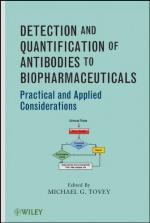|
This section contains 2,259 words (approx. 8 pages at 300 words per page) |

|
Antibodies, or Y-shaped immunoglobulins, are proteins found in the blood where they help to fight against foreign substances called antigens. Antigens, which are usually proteins or polysaccharides, stimulate the immune system to produce antibodies. The antibodies inactivate the antigen and help to remove it from the body. While antigens can be the source of infections from pathogenic (disease-causing) bacteria and viruses, organic molecules detrimental to the body from internal or environmental sources also act as antigens.
Once the immune system has created an antibody for an antigen whose attack it has survived, it continues to produce antibodies for subsequent attacks from that antigen. This long-term memory of the immune system provides the basis for the practice of vaccination against disease. The immune system, with its production of antibodies, has the ability to recognize, remember, and destroy well over a million different antigens.
There are...
|
This section contains 2,259 words (approx. 8 pages at 300 words per page) |

|


